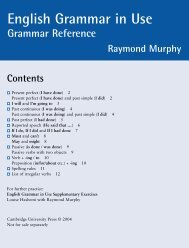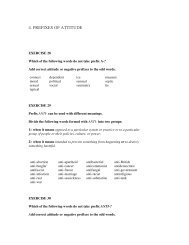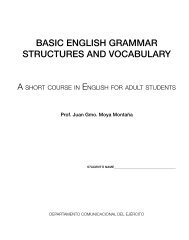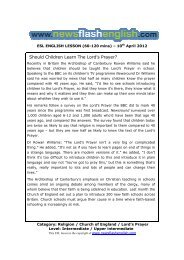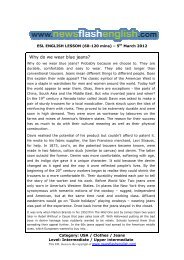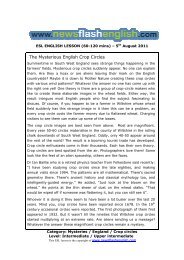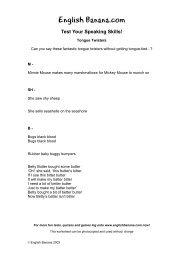A Grammar of the English Tongue - ESL Teachers Board
A Grammar of the English Tongue - ESL Teachers Board
A Grammar of the English Tongue - ESL Teachers Board
You also want an ePaper? Increase the reach of your titles
YUMPU automatically turns print PDFs into web optimized ePapers that Google loves.
A <strong>Grammar</strong> <strong>of</strong> <strong>the</strong> <strong>English</strong> <strong>Tongue</strong> 55[Greek: aiôn], ævum, ay, age, ever; floccus, lock; excerpo, scrape, scrabble,scrawl; extravagus, stray, straggle; collectum, clot, clutch; colligo, coil:recolligo, recoil; severo, swear; stridulus, shrill; procurator, proxy; pulso, topush; calamus, a quill; impetere, to impeach; augeo, auxi, wax; andvanesco, vanui, wane; syllabare, to spell; puteus, pit; granum, corn;comprimo, cramp, crump, crumple, crinkle.Some may seem harsher, yet may not be rejected, for it at least appears, thatsome <strong>of</strong> <strong>the</strong>m are derived from proper names, and <strong>the</strong>re are o<strong>the</strong>rs whoseetymology is acknowledged by every body; as, Alexander, Elick, Scander,Sander, Sandy, Sanny; Elizabetha, Elizabeth, Elisabeth, Betty, Bess;Margareta, Margaret, Marget, Meg, Peg; Maria, Mary, Mal, Pal, Malkin,Mawkin, Mawkes; Mathæus, Mattha, Mat<strong>the</strong>w; Martha, Mat, Pat;Gulielmus, Wilhelmus, Girolamo, Guillaume, William, Will, Bill, Wilkin,Wicken, Wicks, Weeks.Thus cariophyllus, flos; ger<strong>of</strong>ilo, Italian, giriflee, gil<strong>of</strong>er, French,gilliflower, which <strong>the</strong> vulgar call julyflower, as if derived from <strong>the</strong> monthJuly; petroselinum, parsley; portulaca, purslain; cydonium, quince;cydoniatum, quiddeny; persicum, peach; eruca, eruke, which <strong>the</strong>y corruptto earwig, as if it took its name from <strong>the</strong> ear; annulus geminus, a gimmal, orgimbal-ring; and thus <strong>the</strong> word gimbal or jumbal is transferred to o<strong>the</strong>rthings thus interwoven; quelques choses, kickshaws. Since <strong>the</strong> origin <strong>of</strong><strong>the</strong>se, and many o<strong>the</strong>rs, however forced, is evident, it ought to appear nowonder to any one if <strong>the</strong> ancients have thus disfigured many, especially as<strong>the</strong>y so much affected monosyllables; and, to make <strong>the</strong> sound <strong>the</strong> s<strong>of</strong>ter,took this liberty <strong>of</strong> maiming, taking away, changing, transposing, ands<strong>of</strong>tening <strong>the</strong>m.But while we derive <strong>the</strong>se from <strong>the</strong> Latin, I do not mean to say, that many<strong>of</strong> <strong>the</strong>m did not immediately come to us from <strong>the</strong> Saxon, Danish, Dutch,and Teutonick languages, and o<strong>the</strong>r dialects; and some taken more latelyfrom <strong>the</strong> French or Italians, or Spaniards.The same word, according to its different significations, <strong>of</strong>ten has adifferent origin; as, to bear a burden, from fero; but to bear, whence birth,




